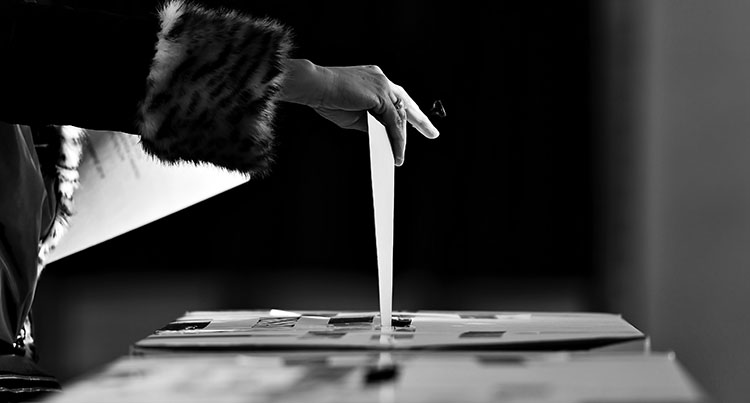Biden administration offers recommendations in new report to improve voting access for Native Americans

Image from Shutterstock.
In a report released Thursday, the Biden administration details the barriers that Native Americans face in the voting process, as well as best practices and recommendations for eliminating those barriers.
According to the Interagency Steering Group on Native American Voting Rights, which published the report as part of an executive order signed by President Joe Biden in March 2021, poll taxes, literacy tests and other discriminatory policies that were meant to suppress Black voters have also affected Native American voters.
Additionally, after the U.S. Supreme Court struck down parts of the Voting Rights Act of 1965 that expanded access to voting for Native Americans in Shelby County v. Holder in 2013, many states enacted laws that restricted voting by Native Americans.
“Native voters often have to overcome language barriers, a lack of accessibility for voters with disabilities, cultural disrespect and outright hostility, geographically remote residences, and persistent poverty—conditions that have only been exacerbated by the COVID-19 pandemic,” the White House said in a statement after the report’s release. “State laws and local practices also present too many Native voters with undue impediments to full and fair exercise of the franchise, including barriers in receiving information about the voting process; discriminatory redistricting; and burdens in voter registration, voter identification, voting in person, and voting by mail.”
The steering group consulted with tribal leaders and members in various regions and hosted listening sessions with Native Hawaiians, organizations that advocate for tribal voting rights and state and local election officials in areas with significant Native American communities. Their recommendations include federal legislation, action by federal agencies and action by state and local governments.
These recommendations include:
• Congress should pass the John Lewis Voting Rights Advancement Act, which would restore the Voting Rights Act of 1965, and the Native American Voting Rights Act, which would ensure that Native American voters have equitable opportunities to vote in person or by mail.
• More states should pass legislation that incorporates provisions of the Native American Voting Rights Act and ensure that existing laws are implemented fairly.
• Federal, state and local policymakers should include tribal leaders and members on task forces and other representative bodies to ensure that their voices are heard when making decisions that impact Native American voters.
• Local officials should ensure that elections offices and polling places that serve Native American communities are conveniently located and staffed by bilingual, well-trained members of those communities.
• Federal, state and local governments and private providers should provide reliable, affordable and high-speed access to the internet in all tribal communities.
• The U.S. Postal Service should consider adding routes, offices and personnel in Native American communities and prioritize assigning postal addresses to homes on tribal lands.
• Jurisdictions that serve Native American voters should provide effective language assistance by translating all materials, even if they are not required by law.
• Federal and state policymakers should ensure that election officials in Native American communities have the funding that they need to ensure equitable access to voting by all tribal members.
The White House said government agencies will work with partners and other allies to implement the report’s recommendations. The U.S. Department of the Interior also announced Thursday that it will designate the Haskell Indian Nations University in Kansas and the Southwestern Indian Polytechnic Institute in New Mexico as voter registration agencies. These are department-operated, postsecondary tribal institutions.
According to NPR, Deb Haaland, secretary of the Department of the Interior, said in a statement “the Interior Department is committed to defending the right to vote, which includes increasing access to voter registration and engaging young people in our democratic system.”
See also:
ABA Journal: “Voting access and protection against violence for Native Americans should be top priorities, ABA House says”



